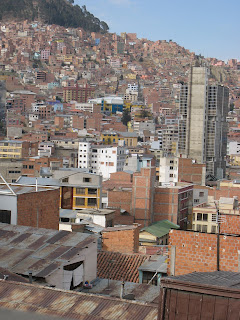Certain inconveniences of life in
Bolivia have actually endeared themselves to us through the years. I write this
tongue-in-cheek, but it’s true. The cobblestone streets, the rattle-trap
busses, the heavy blankets that make going to bed seem more like being buried—the
list goes on and on. These are life-style quirks that make us smile.
I put electric shower-heads on
this list. We are currently staying at a hostel in the upper section of La Paz,
near the New Jerusalem Friends Church. Like most hostels (and homes) this one
does not have hot running water. Here is where the electric shower-head comes
in. This device houses electric coils that heat up, allowing the water that
flows through them to become somewhat hot. “Somewhat” is a key word here. When
the water pressure is sufficient, the coils automatically switch on. When the
pressure lowers, they switch off. This all happens quickly. In a hostel, water
pressure varies depending on how and when other people in the building are
turning water off or on.
I suppose one could consider it a
rich sensual experience. In rapid succession, the water goes from tepid to
cool, back to tepid and up to somewhat (that word again) warm. If the pressure
gets too low, the coils switch off and you have to quickly turn the pressure up
before the water becomes icy. This is tricky and you will most likely have to
fiddle with the faucet before you reach a temperature that approaches lukewarm.
And once you get there, someone in the next room turns on his faucet.
We’ve named our present shower
Maud. Personalizing the thing helps us focus on the humor rather than the
inconvenience. “Shower” in Spanish—“la ducha”—is a feminine noun, which helped
us name her. But something else convinced us of her femininity. Maud is clearly
going through menopause. While normally providing us with water ranging from
cool to tepid, she occasionally has these glorious hot flashes. For a few
seconds, I can actually imagine that I’m home in my own comfortable,
convenient, and consistently hot shower in Newberg, Oregon. It never lasts
long, but I’ll take what I can get. Way to go, Maud!








